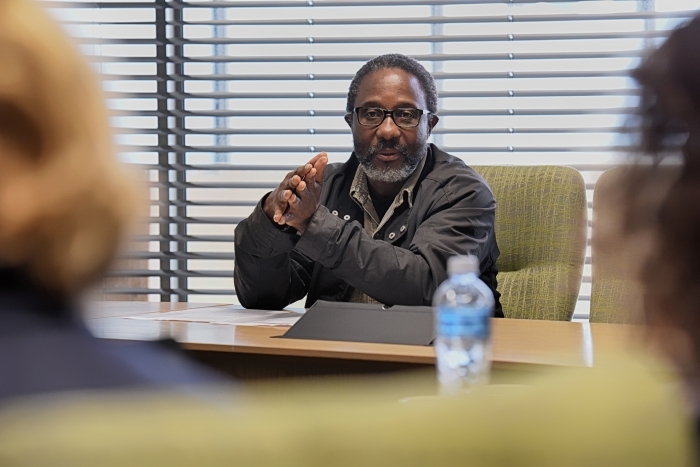African Studies: how to make the continent an “equal partner”
12 May 2016 | Story Yusuf Omar. Image Michael Hammond.
The goal of the African Studies discipline was to make Africa an equal partner in global geopolitics and scholarship, argued Professor Lungisile Ntsebeza, holder of the AC Jordan Chair in African Studies at UCT.
Ntsebeza was speaking at a panel discussion at which a “one world” approach to scholarship was on the table. The discussion was held under the banner of the International Alliance of Research Universities (IARU) at UCT on 3 May 2016.
For African Studies to be meaningful, it needed to be research-led, Ntsebeza said, and this involved a rigorous look at what was being taught at universities and how it was being taught.
The Rhodes Must Fall (RMF) campaign of 2015 had thrust the call for decolonisation back into the frame, said Ntsebeza. It was as if students had “almost demanded” that African Studies be foregrounded, he added.
“The protests and the call for the decolonisation are reminiscent in many ways to similar calls in various parts of the postcolonial world in the immediate post-independence period, particularly in Africa,” said Ntsebeza.
By “urging us to rethink both the historical, symbolic violence and the current epistemic violence”, the protests had zoned in on the “critical intellectual agenda” that Ntsebeza held as salient to the African Studies project.
Now, the challenge for the global social movement that RMF spawned was to harness its energy as an intellectual project.
Postcolonial and post-apartheid redress was articulated only in material terms, argued Ntsebeza, and did not encompass symbolic, intellectual and epistemological redress.
“This, we now see, is a major deficit,” he said.
Ntsebeza said that African scholars and scholarship had been marginalised for too long. The ideal was to maximise the potential of local expertise and use this in tandem with useful Eurocentric knowledge to address local challenges and develop African societies, but universities had thus far failed in this mission.
In terms of the discipline of African Studies as a whole, Ntsebeza acknowledged that some within the field were aware that Africa could not be treated as an enclave; instead, the goal should be to explore how Africa could become an equal partner globally.
Eventually, African Studies should not only exist as a department on its own, said Ntsebeza; it should rather guide other departments to interrogate how and what they teach, to the end that an Afrocentric ethos is infused in scholarship of every field.
Professor Kiichi Fujiwara the University of Tokyo cautioned that African Studies could be subverted by the state. Japan, he said, had used Asian Studies in universities to artificially position itself as the regional power.
Ntsebeza agreed that the line between the state and universities needed to be clear and respected, noting the way African Studies had been used to further political agendas in Ghana and Mozambique in the immediate aftermath of colonialism.
 This work is licensed under a Creative Commons Attribution-NoDerivatives 4.0 International License.
This work is licensed under a Creative Commons Attribution-NoDerivatives 4.0 International License.
Please view the republishing articles page for more information.










